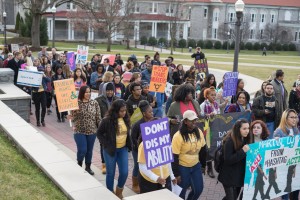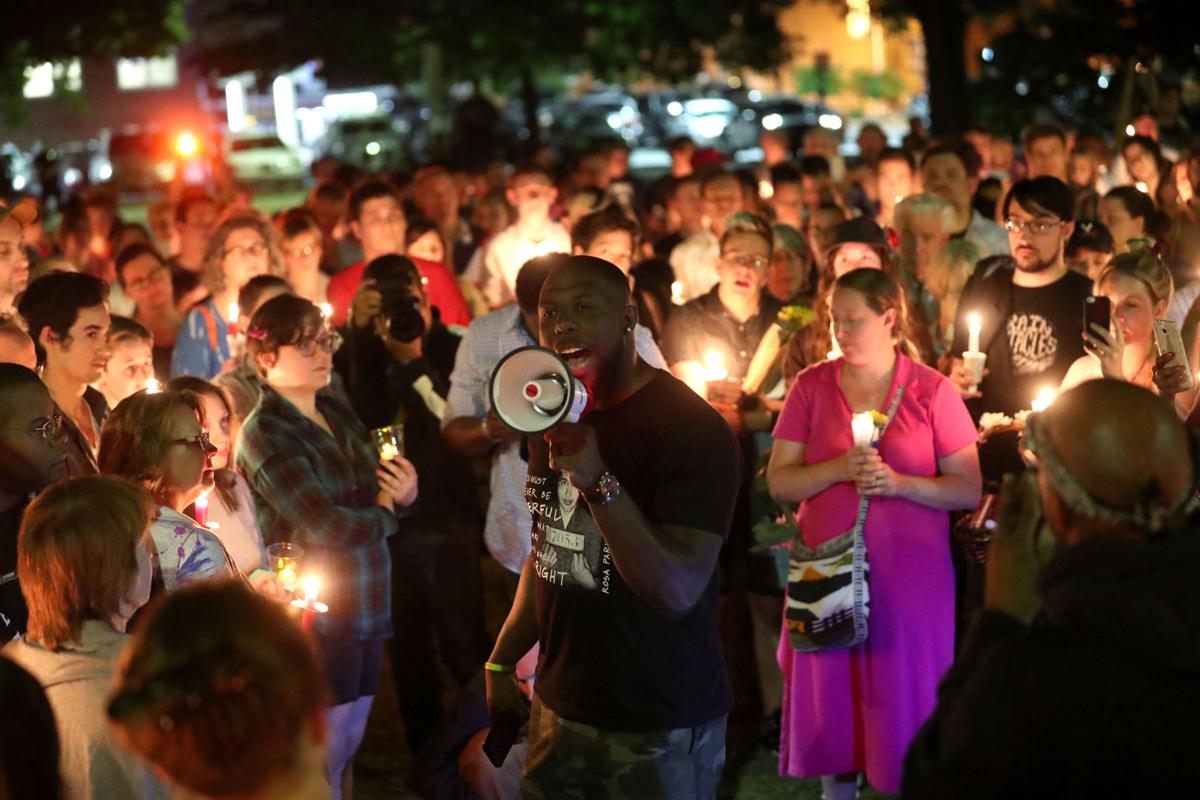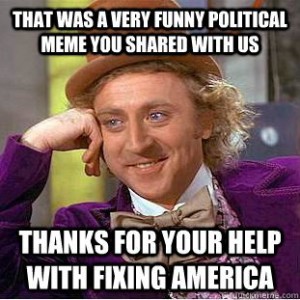
JMU students hold a commemorative march and speak out every MLK Day. Signs this year featured hashtags, some for actual online conversations, some for imagined ones. Both suggest an emergent mindset regarding social media and political or democratic engagement.
This summer, I have been participating in a #DigCiz conversation that is helping me think more carefully about the relationship between activities in the digital world, especially social media, and activities in the analog world, especially in the American political system. In a recent Tweet, I referred to the nexus between #DigCiz and #TradCiz (Traditional Citizenship) (I think I made #TradCiz up. If not, please let me know). Part of this nexus includes what is called “civictech,” a term used in civic-engagement-in-higher-ed conversations to reference a host of new digital tools designed to boost individuals’ participation in the democratic process. Examples of civic tech that I know are: TurboVote, icitizen, and BallotReady. Organizations promoting these digital tools are many and varied; they range from colleges and universities to community-based non-profits. In From Voice to Influence, ed. by Danielle Allen and Jennifer Light, I read several essays describing the myriad ways in which young Americans are using social media to engage in political acts. What’s fascinating to me is that they often don’t realize that that is what they are doing. Posting a HuffPo piece to a Facebook page, grabbing a digital photo and turning it into a meme, using a hashtag, organizing a demonstration, signing an online petition–these are the sorts of things people do on a regular basis. Yet they don’t think of themselves as political actors capable of effecting change. They have a platform from which to speak individually and collectively (voice), but lack the awareness and ability to act politically (influence).
So this is where I attempt to broaden the #DigCiz conversation from talking about identities and selves and actions in online communities and networks to include more deliberate consideration of identities and selves in face to face political communities and spaces. And actually, this summer’s conversation is already moving in that direction. (It’s just taken me a while to pull together this post.)
There’s a clear thread running through Bonnie Stewart‘s provocative opening salvo (I’m a shit about citizenship); Katia Hildebrandt’s and Alec Couros’s plaintive call for us to move past cybersafety/personal responsibility models of digital citizenship to justice-oriented ones; and this week’s ruminations by Kate Bowles, Maha Bali, Amy Collier, Autumm Caines, Andrew Middleton, Sheila McNeil, and Chuck Pearson, on citizenship and national identity, kith and kin, placemaking and feelings of belonging or alienation. Bali writes:
“I love my country . . . in spite of all that is wrong with it. I just want to fix it.”
What does it take to “fix” a country? Let me be more specific: what does it take to fix a democratic society with a representative government in the digital age?
Sheila McNeil says, “Like Kate, . . . I think of citizenship as a formal, bureaucratic process . . . perhaps because I have never really been in a position where it is threatened or rights taken away from me.” Citizenship is not “benign,” as Amy Collier notes. Historically (and still today), it is defined by geographic borders and boundaries (themselves often arbitrary lines on a map), but especially by a sense of shared ancestry (blood) and cultural heritage (values, religion, folklore, foodways, whatever). Kith and kin, place and shared identity–these words still matter. But citizenship also means membership in the civitas, the polity, an entity marked by the exercise of political rights and responsibilities. Whereas some citizens naturally belong, are born into the polity, others are brought in and Others still are excluded from membership. Citizenship is a spectrum.
In the United States as in other democratic societies, rights inhere in individuals. “We hold these truths to be self-evident, that all men are created equal, that they are endowed by their creator with certain unalienable rights, and that among these are life, liberty, and the pursuit of happiness.” So many ideas are bound up in this oft-quoted sentence. I like to ponder “unalienable.” I’m convinced that most people don’t fully appreciate what it means. Or if they do, they seek to limit its meaning by narrowing the definition of words like “men,” “equal,” and “creator.” This narrowing started, of course, in 1776, before the ink on the Declaration had even dried, and sadly, persists to the present. (I could write a long post about white Americans’ misguided belief that civil rights were/are gifts they can bestow on African Americans when they feel they deserve them, but I digress.)
It troubles me that so many fully-enfranchised citizens have stopped exercising their rights and responsibilities. I mean, they have opted out of the formal democratic process. That is one of their rights, of course, and it’s mighty ironic. According to public opinion polls, like this one and this one from the Pew Research Center, registered voters are deeply dissatisfied with the party system and deeply distrustful of government, yet another recent poll indicates widespread agreement on certain elements of a strong democracy and a pronounced desire to maintain and preserve them. Meanwhile, the folks at both IDHE (Institute for Democracy and Higher Education) and CIRCLE (Center for Information and Research on Civic Learning and Engagement) find that Millennials have especially serious doubts about the health of American democracy. So, what does it take to fix a country?
Bottom line, I agree with hundreds if not thousands of other academics in the US that colleges and universities, especially public ones, have a clear responsibility to reverse these trends. From 2008 until now, I have led civic engagement efforts at JMU, and I am proud of the work that faculty, staff, administrators, and students here have accomplished. But we need to do more to reach young citizens where they are.
Youth have a long history of activism and digital media offers exciting new possibilities. Despite surveys like the ones cited above, online political activity is actually trending upward and is doing so for both conservatives and liberals. Using Henry Jenkins’ concept of participatory culture, Kahne, Middaugh, and Allen argue in From Voice to Influence (35-55) that interest-driven online networks serve as important pathways into political participation. Though clearly different from face to face networks, online versions often develop in participants similar sets of interactive, peer-based practice: investigation, dialogue & feedback, circulation, production, and mobilization. A blog post cannot capture the scope of their findings or their sources, so suffice it to say that “what appears on the surface to be a matter simply of humor or fun . . . may in fact be an appropriation of pop culture for social change (50).
From clever memes and MoveOn petitions to downloadable hip hop dissents or Teen Vogue articles, digital pop culture intersects with political issues and #DigCiz on a daily basis. The challenge is to connect these new activities and networks to time-honored participatory political practices such as voting, engaging in deliberative dialogue, monitoring elected officials, and even office-holding. Several books on this intersection are on my reading list: Zeynep Tufekci, Twitter and Tear Gas: How Social Media Changed Protest Forever ; Christopher J. LeBron, The Making of Black Lives Matter; and Eric Liu, You’re More Powerful than You Think. The list of such works grows daily.
At JMU, we have used a combination of digital and face to face tools to encourage undergraduates’ civic engagement. Last fall, as the nation geared up for the Presidential election, we sent mass emails on National Voter Registration Day that included a link to TurboVote, a platform that enables out of state students to request paper documents from their home districts and directs Virginians to the state’s online registration system. Either population can elect to receive electronic reminders of deadlines and election day notices delivered right to their phones. Additionally, students with DukesVote manned tables and visited dozens of classes, especially large lectures, to register students using paper forms. Twitter (@JMUDukesVote) enabled us to communicate with other student organizations’ social media accounts to promote local candidate forums, debate watch parties, precinct locations, and return parties (#iVoted16, #DukesVote). Neither icitizen nor BallotReady caught their interest, however, these platforms hold great potential for educating people about public issues and candidate positions. It is slow going. Most Dukes, like most youth, don’t consider themselves political actors, despite their deep and sincere concerns. They feel alienated from their polities, from the civitas. They hunger to make a difference, they are politically active online in their social environments, but lack role models and the political agency needed to effect change in the “real world”. To fix a country founded upon democratic principles, we the people in #highered must develop students’ civic agency and their sense of national belonging. Our kith and kin demand it.

In May 2017, citizens of Charlottesville, VA, home of the University of Virginia, staged a candle-lit vigil to counter an earlier torch-lit rally by white supremacists protesting the removal of a statue memorializing Robert E. Lee. Leaders of both demonstrations used social media, chiefly Facebook and Twitter, to organize their events. Image from The Daily Progress.

